The key aim when it comes to sugar and oral health is to reduce the amount and frequency of consuming food and drinks that contain free sugars.
A healthy diet is important for oral and general health. Scientific evidence indicates that the population of the UK eats too many ‘free sugars’ (see below), too much saturated fat and salt, and not enough fruit, vegetables, fibre and oily fish.
What are free sugars?
It is probably easiest to think of free sugars as those that are added to food and drinks by the manufacturer, the chef/cook or yourself (the consumer), AS WELL as sugars that are naturally present in honey, syrups and fruit juices. It DOES NOT include sugars that are found naturally in whole FRESH fruit and vegetables and those naturally present in milk and milk products. Clear? Don’t worry! It can be a bit of a minefield trying to work out what is safe for teeth and what may contribute to tooth decay/ cavities and many other non communicable diseases. If you’re unsure about what food and drinks are high in free sugars, check the labels. Check a product’s ingredient list and look for sugars among the first two or three ingredients including sugar, sucrose, maltose, brown sugar, corn syrup, cane sugar, honey and fruit juice concentrate. Learn more about food labels here.
Common food and drinks that are high in free sugars include:
• sugary soft drinks • sweets and chocolate confectionery • cakes and biscuits • buns, pastries, fruit pies • puddings • table sugar • sugary breakfast cereals • jams, preserves, honey • ice cream and sorbets • fruit juices and smoothies • milk-based beverages with added sugar • sugar-containing alcoholic drinks • dried fruits • syrups and sweet sauces
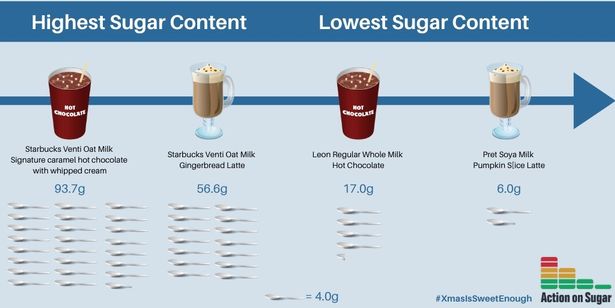
Honey, fruit smoothies, fresh fruit juice and dried fruit all contain decay causing sugars. Because dried fruit can stick to the teeth, it is better to eat this as part of a meal rather than a between-meal snack. Learn more about the work our friend and colleague Jo Dawson’s is doing to raise awareness of dried fruit at her website Awesome Oral Health.
When it comes to fruit, fresh fruit is best. Fruit canned in juice is better than fruit in sugary syrup.
Unlike many foods that are high in free sugars, fruit is packed with lots of nutrients that help provide us with a balanced diet for good health. It is bursting with vitamins, minerals, antioxidants and many nutrients that our bodies need in order to boost immunity, fight diseases, keep us regular and build health skin, hair and nails. Fresh fruit (or alternatively frozen fruit, or fruit canned in juice) are recommended snacks between meals.
Whole fruit contains natural sugars, a mix of sucrose, fructose and glucose. These sugars, unlike free sugars, are naturally occurring in fruit, rather than being added.
There is evidence to suggest that people who eat lots of fruit and vegetables are less likely to develop chronic diseases such as coronary heart disease and some types of cancer.
Remember – fizzy drinks, soft drinks, juice drinks and squashes sweetened with sugar have no place in a child’s daily diet.
Liverpool City Council’s Save kids from sugar website have some great resources available here.
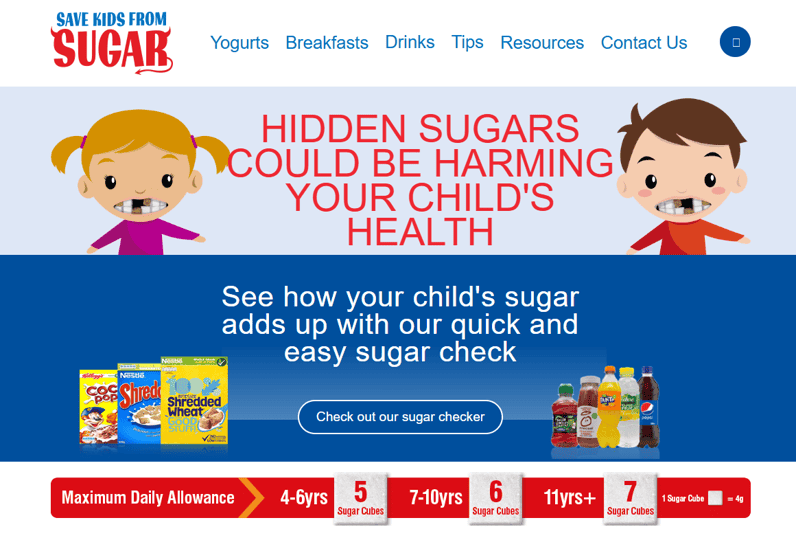

The British Heart Foundation info graphic highlights ‘shades’ of sugar – cutting down on these is good for your mouth, your heart overall health and well being.
High-energy food supplements contain high levels of sucrose (free sugars). These may be prescribed for the elderly, those convalescing or recovering from illness. They may also be used as part of an elite athlete’s nutritional regime.
When food supplements are taken by anyone with natural teeth, it is important to seek advice on prevention. If you use dietary supplements, speak to your dental team or Growing Smiles Coach about what you can do to prevent tooth decay. Options may include using a high fluoride toothpaste and/or other products that help product teeth such as Tooth Mousse, MI Paste Plus or a fluoride mouth rinse.
If you take medication frequently or long term, ask that it is sugar free to reduce the risk of tooth decay.
Eating too much sugar can make you gain weight, cause tooth decay and increases your risk of a number of non communicable diseases.
The best way to prevent tooth decay is by eating at mealtimes only and avoiding sugary drinks and snacks especially before bedtime. With regards to drinks between meals and before bedtime, best to stick to water, plain milk, tea or coffee (without sugar). Many ‘prepared’ hot drinks e.g. latte, mocha coffees etc will have high sugar content.
Sugar-free drinks made with fruit concentrate can contribute to tooth decay. (The World health Organisation classify fruit concentrates as ‘free sugar’). If drinking diluting squash/juice aim to keep to mealtimes only and dilute 1 part juice to 10 parts water.
Read more about the benefits of drinking water here.
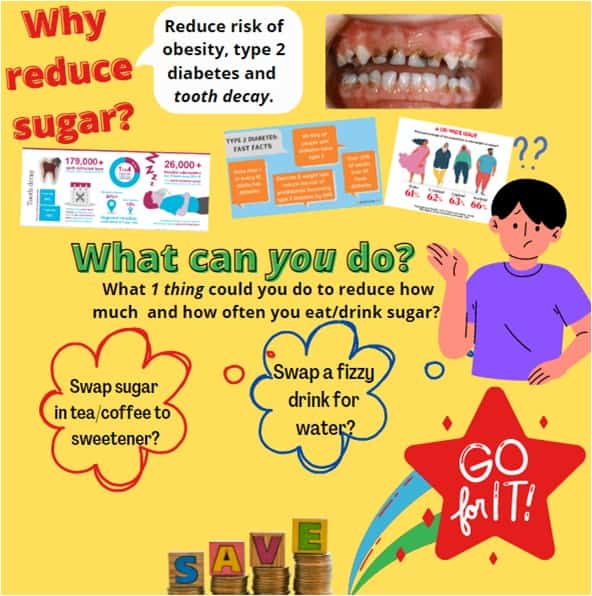
So how do free sugars impact oral health?
Any food or drink that contains free sugars can be used by bacteria in the plaque biofilm (the sticky stuff that forms on the teeth) to form acids. These acids dissolve tooth surfaces which then leads to tooth decay.
Frequent sugar attacks on tooth surfaces can lead to tooth decay at ANY age. More people are living longer with their own teeth, making older people (who still have their own teeth), just as susceptible to tooth decay as younger people. Root surfaces that are exposed by receding gums (which is more common as we get older), are softer and will decay more rapidly than the enamel that covers the crown of the tooth. Find out more about tooth decay here.
Regularly eating food and drinks high in free sugars increase the risk of obesity and tooth decay. Reducing the amount and frequency of sugar intake will have health benefits including reducing weight gain and obesity, which in turn, will reduce the risk of heart disease, type 2 diabetes and some cancers. Find out more about how sugars affect our health here.
How much sugar is too much?
.
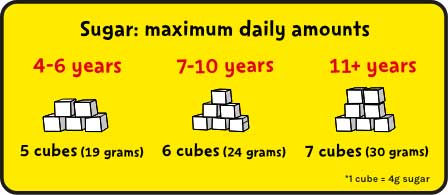
Reports by the World Health Organisation (WHO) and the Scientific Advisory Committee on Nutrition (SACN), highlight the need to reduce sugar intake to 5% of our energy intake. This equates to a maximum daily allowance of 7 teaspoons/cubes or 30g of sugar per day for an adult. For children ages 7-11 years this is 24g and children ages 4-6 19g
For more information on cutting down on sugar click here.
The British Heart Foundation have a useful resource about taking control of your sugar intake. It can be downloaded here.
The UK dietitians association fact sheet on sugar can be found here.
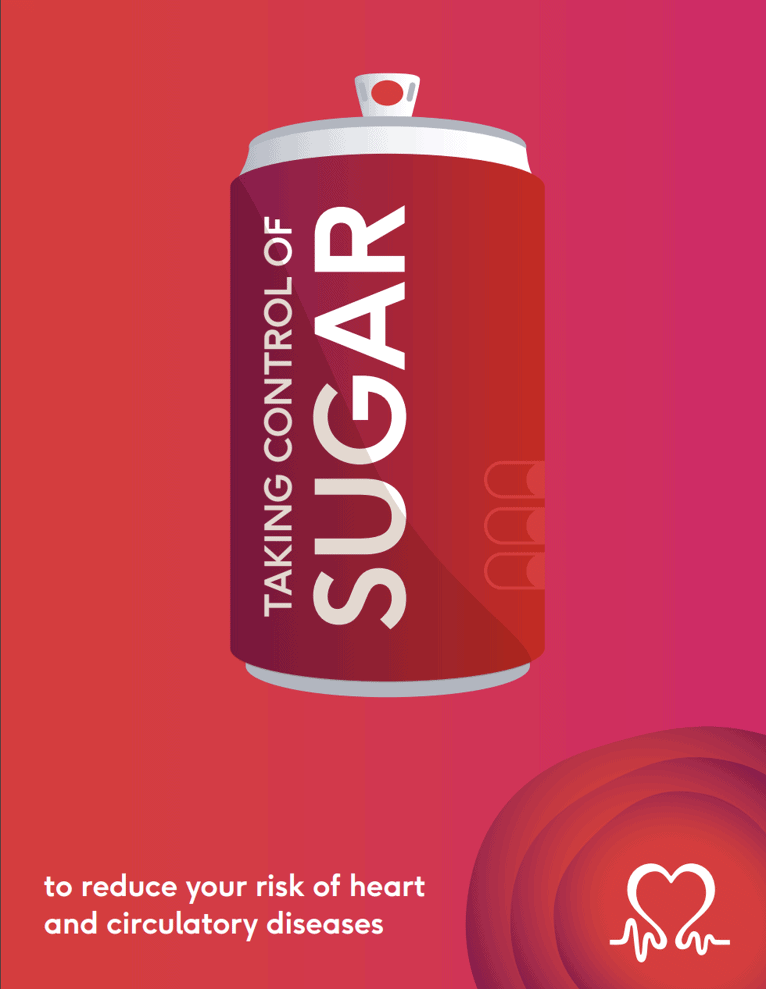
FIZZY DRINKS
The type of sugars most adults and children in the UK eat too much of are “free sugars” with fizzy drinks playing a large role in weight gain and tooth decay (cavities). Listen to this 10 minute clip from RTE Radio of Claire Byrne talking to Linda Reynolds, Dietician with the Ireland Nutrition and Dietetic Institute to learn more about fizzy drinks and their impact on oral and overall health.
What does your Stephan Curve look like?
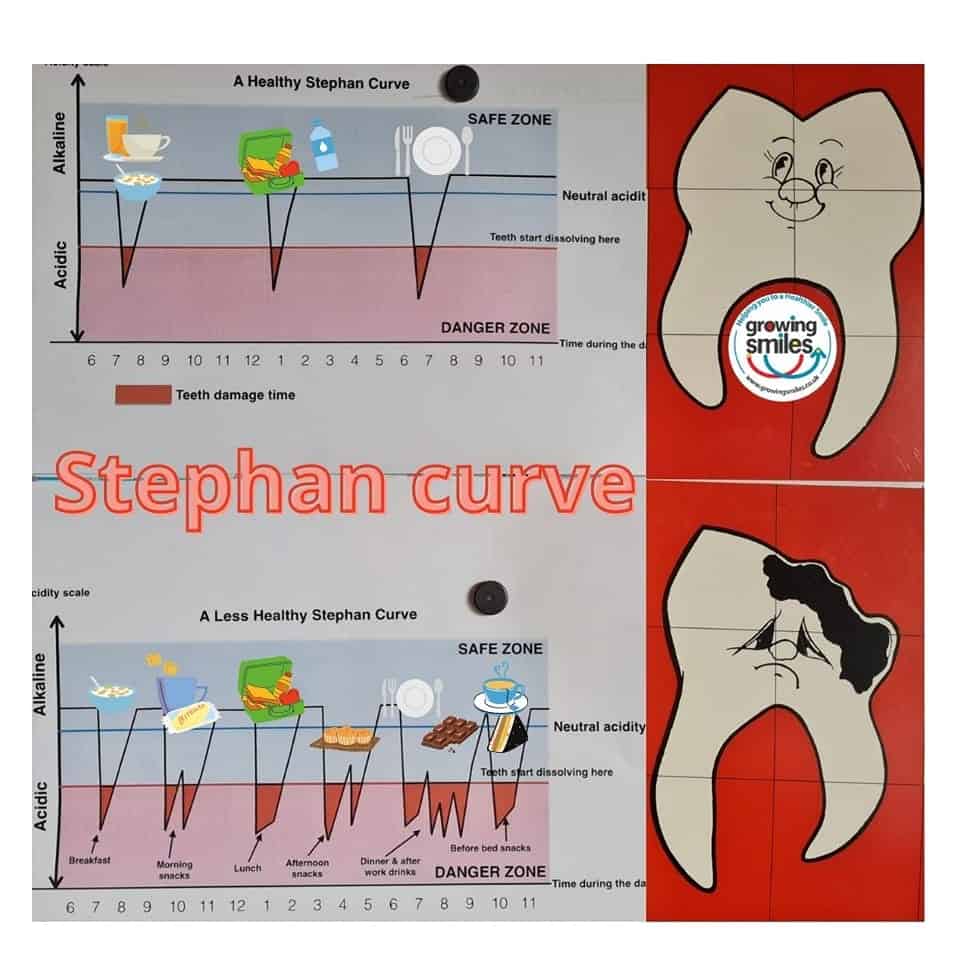
The curve on a graph, first described by Robert Stephan in 1943, showing the fall in pH below the critical level of pH 5.5, at which demineralization of enamel occurs after eating/drinking fermentable carbohydrates, acidic liquids, or sugar in the presence of acid producing bacteria. After eating/drinking saliva helps clear the acids and a normal pH is reached. When this happens remineralisation occurs healing the tooth surface.
Frequent intakes of fermentable carbohydrates = low pH is maintained for longer periods, not allowing remineralization (healing/hardening) to take place.
Best to keep sugar food/drinks to mealtimes only and avoid the hour before bedtime. Learn more about saliva.
So, what’s the alternative?
SUGAR FREE? But who doesn’t enjoy a sweet treat? Surely there must be a way to have your cake and eat! Sugar substitutes we recommend.
You will find the following used in the sugar free sweets and chewing gum available at Growing Smiles.
XYLITOL
Xylitol is a sugar-free sweetener that is plant based, low calorie, and will not promote tooth decay. NB: Xylitol is dangerous for dogs and can be fatal if consumed by canines.
Xylitol looks and tastes like sugar, but, doesn’t have the same impact on oral and general health. In fact, it has a range of benefits. It has fewer calories, doesn’t raise blood sugar levels and has anti-tooth decay properties. Xylitol has also been shown to have anti-inflammatory properties, which may have a positive impact on gum inflammation.
Xylitol is a naturally occurring five-carbon sugar polyol. Polyols are carbohydrates, but they are not sugars. It occurs naturally in small amounts in fibrous fruits and vegetables, trees (birch and other hardwoods), corncobs, and even the human body.
How does it help reduce tooth decay?
Xylitol reduces the number of decay-causing bacteria (e.g Streptococcus mutans which are also referred to as S mutans) in the mouth, and stops these bacteria producing the acids which cause tooth decay. It has been shown to decrease the transmission of S. mutans from mothers to children and can be used to help control rampant decay in baby teeth.
As Xylitol creates an alkaline environment in the mouth, it may benefit those at risk of acid erosion. Find out more about acid erosion here.
Is there a down-side?
As with other sugar alcohols, it can have an impact on the gastrointestinal tract and cause some bloating and diarrhoea. It is generally well tolerated. Gradually increasing your use of Xylitol allows your body to adjust without side effects.
NB. Xylitol can be very toxic to dogs. Products containing xylitol should be stored in a safe place that pets cannot reach.
You can read more about how Xylitol helps prevent tooth decay here.
Xylitol can be found in sweets and chewing gum. Check out our Xylitol products here and here.
Xylitol can also be found in some toothpastes and mouthwashes. See our toothpastes here.
Erythritol
Erythritol is a sugar-free sweetener that is plant based, low calorie, and will not promote tooth decay. Erythritol has also been studied as a 1:1 substitute for sugar that blocks the growth of one of the most common decay causing bacteria Streptococcus mutans. It also decreases plaque biofilm attachment, without the same gastrointestinal effects as xylitol. It is a four-carbon polyol (sugar alcohol) that shares many properties typical for the polyols family (e.g., sorbitol, xylitol). i.e. sweetness similar to sucrose, has no calories, it is safe, has no decay (cavity) causing potential, has a low glycaemic index, and is suitable as a bulking agent in food manufacturing. Dr Johns and Mintastic use erythritol in production.
STEVIA
Stevia is a sweetener derived from plants that contains no calories or sugars.
ISOMALT
Isomalt is a sugar substitute made from beets that does not promote tooth decay.
MALTITOL
Maltitol is a sugar substitute that does not promote tooth decay.
Learn more about Erythritol here.
Learn more about tooth decay here.
Want to reduce sugar in your child’s diet?
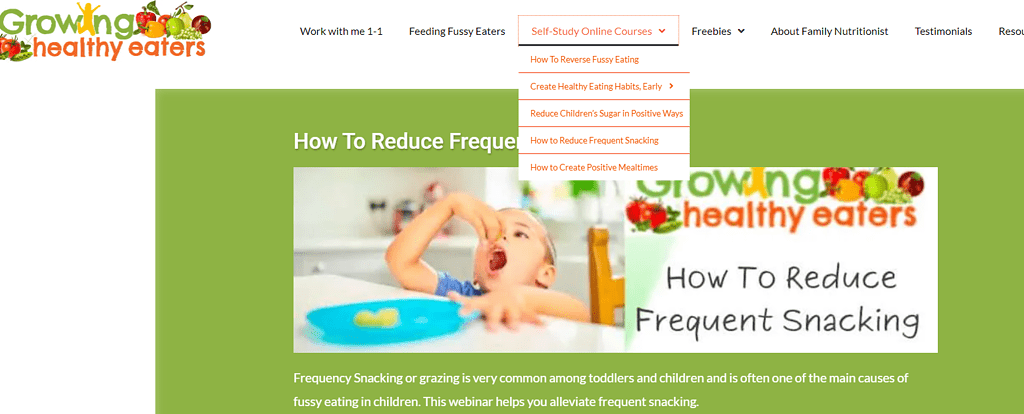
We recommend taking a look at Dr Colette Reynolds website GrowingHeatlhyEaters.ie where you will find online courses to help including ‘How to reduce children’s sugar in positive ways’. Please keep in mind this focuses on reducing overall sugar in your child’s diet.
For dental health, remember the frequency of eating/drinking sugary food/drink as well as the amount of sugar is a key component of reducing tooth decay. Along side good oral hygiene using a fluoride toothpaste. Learn more here.
[yotuwp type=”videos” id=”rPZQihDjYjE” ]


